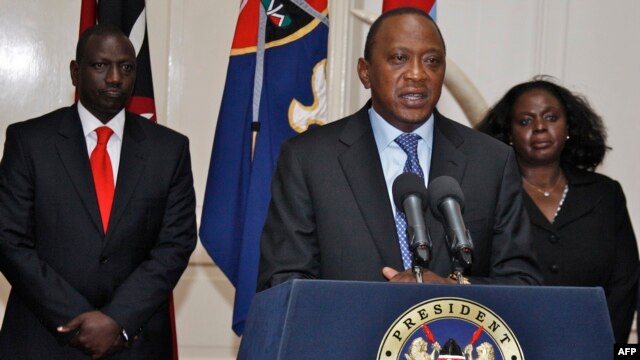Kenyan president says siege at shopping center over
| Publisher | Radio Free Europe/Radio Liberty |
| Publication Date | 24 September 2013 |
| Cite as | Radio Free Europe/Radio Liberty, Kenyan president says siege at shopping center over, 24 September 2013, available at: https://www.refworld.org/docid/5261039712.html [accessed 19 October 2022] |
| Disclaimer | This is not a UNHCR publication. UNHCR is not responsible for, nor does it necessarily endorse, its content. Any views expressed are solely those of the author or publisher and do not necessarily reflect those of UNHCR, the United Nations or its Member States. |
September 24, 2013
By RFE/RL
 Kenyan President Uhuru Kenyatta speaks during a press conference in Nairobi in front of Kenyan Vice President William Ruto (left) on September 24.
Kenyan President Uhuru Kenyatta speaks during a press conference in Nairobi in front of Kenyan Vice President William Ruto (left) on September 24.
Kenya's president says security forces have defeated attackers who seized dozens of civilians hostage at a shopping mall in the capital, Nairobi.
In a televised address on September 24, Uhuru Kenyatta said 61 civilians and six soldiers were killed after the gunmen stormed the Westgate mall on September 21.
Five gunmen were killed by gunfire, and 11 suspects were detained.
He said three floors of the building collapsed, and more bodies may be trapped under the rubble.
Kenyatta declared three days of national morning beginning on September 25.
He said he could not confirm reports that a British woman and two or three Americans were involved in the attack.
Somalia's Al-Qaeda-linked Al-Shabab group has claimed responsibility for the attack, saying it was to punish Kenya for sending troops to fight militants in Somalia.
At least 18 foreigners have been reported among those killed in the siege. They include six Britons, as well as citizens of France, Canada, the Netherlands, Australia, Peru, India, Ghana, South Africa, and China.
Kenyan officials say there were 10 to 15 attackers, and have described them as a "multinational" group.
Kenyan Foreign Minister Amina Mohamed said in a U.S. television interview that "two or three Americans" and a British woman were believed to be among the attackers.
She told the "PBS Newshour" show that the Americans were young men, "between maybe 18 and 19" years of age. She said they were "of Somali origin or Arab origin," but had lived in the U.S. state of Minnesota and elsewhere.
U.S. officials have said they are investigating reports of the involvement of Americans.
The mall siege has marked the deadliest terrorist attack in Kenya since the 1998 truck bombing of the U.S. Embassy in Nairobi, which killed more than 200 people. That attack was claimed by the Al-Qaeda network.
Somali President Hassan Sheikh Mohamud has said that the mall massacre showed that Al-Shabab was a threat not just to Somalia, but to the larger international community.
Al-Shabab, which means "The Youth" in Arabic, emerged in war-torn Somalia in 2006.
It is a radical Sunni group, which, at its peak of power, ran much of southern Somalia but has now been pushed back into rural areas by African Union forces, predominantly Kenyan, who are trying to stabilize Somalia and support its weak government.
Al-Shabab enforces strict Shari'a law in the areas it controls, including stoning to death women accused of adultery and amputating the hands of thieves.
On September 24, the United Nations envoy for Somalia called for more international troops to counter Al-Shabab.
Nicholas Kay, the UN's special representative for Somalia, told a news conference in Geneva that Al-Shabab had some 5,000 members and posed an international threat.
With reporting by AFP, dpa, AP, and Reuters
Link to original story on RFE/RL website
